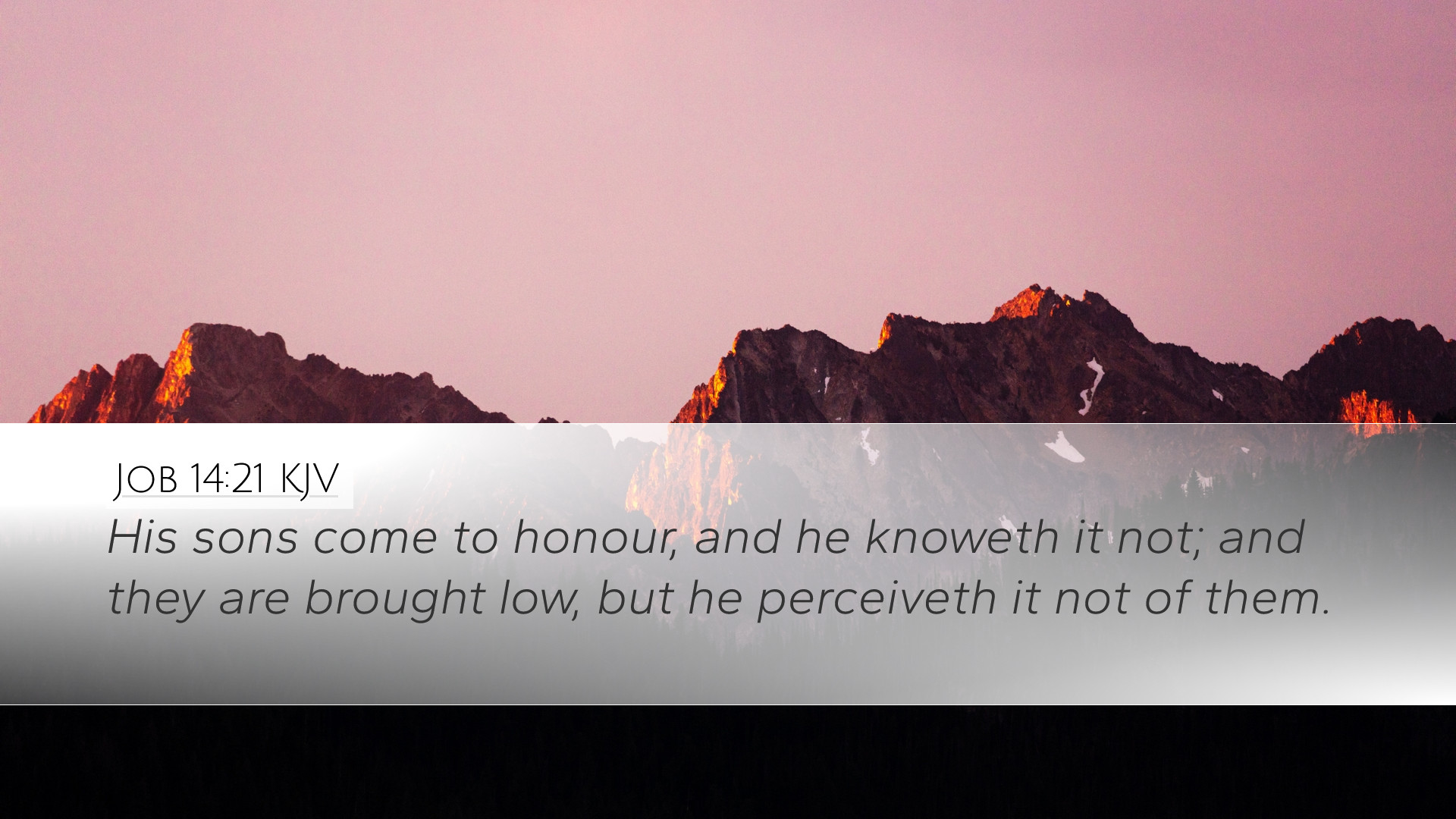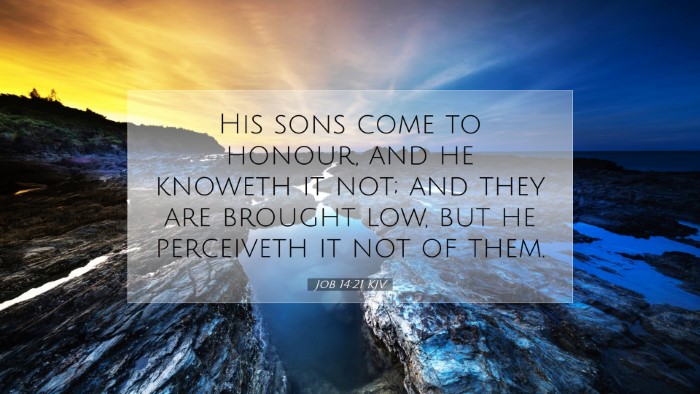Old Testament
Genesis Exodus Leviticus Numbers Deuteronomy Joshua Judges Ruth 1 Samuel 2 Samuel 1 Kings 2 Kings 1 Chronicles 2 Chronicles Ezra Nehemiah Esther Job Psalms Proverbs Ecclesiastes Song of Solomon Isaiah Jeremiah Lamentations Ezekiel Daniel Hosea Joel Amos Obadiah Jonah Micah Nahum Habakkuk Zephaniah Haggai Zechariah MalachiJob 14:21
Job 14:21 KJV
His sons come to honour, and he knoweth it not; and they are brought low, but he perceiveth it not of them.
Job 14:21 Bible Commentary
Commentary on Job 14:21
Verse Context: Job 14:21 states: “If his children come to honor, and he knows it not; or if they be brought low, he knows it not of them.” This verse encapsulates profound themes regarding human existence, the nature of suffering, and the unknowable circumstances surrounding life and death.
Thematic Insights
The insights derived from public domain commentaries reveal the layered complexities of this verse. The interpretations offered by Matthew Henry, Albert Barnes, and Adam Clarke can enhance our understanding significantly.
Matthew Henry
On the Nature of Human Suffering: Henry points out that Job reflects on the transient nature of life and the inevitability of death. He emphasizes that once a man has died, he is removed from the concerns of this world. His children may experience various fortunes, but the deceased is entirely unaware of these events. Henry highlights a poignant truth: the afflictions of life and the eventual fate of the children, whether they rise to honor or fall into disgrace, become irrelevant to the deceased.
Spiritual Application: This brings to the forefront the reality of divine justice. Henry illustrates Job’s acute awareness of mortality and God’s governance over life, signifying a call to live in accordance with faith, recognizing that earthly matters are fleeting. The emphasis is placed on the power of God who orders every event beyond human comprehension.
Albert Barnes
On Knowledge and Ignorance: Barnes delves into the aspect of ignorance post-death that Job discusses. He elucidates that people often live as though their happiness and future are directly tied to the events unfolding around them; however, once they pass from this life, they possess no understanding of earthly affairs. He affirms that life is ultimately about one’s relationship with God rather than the happenings concerning one’s children after death.
Reflection on Legacy: Barnes suggests that this verse stands as a reminder of how ephemeral human recognition and lineage can be. The honor, achievements, or failures of children do not reach the deceased; thus, one’s legacy matters not only in earthly terms but in how one lives righteously before God. The believer’s primary focus should therefore be on nurturing faith, which outlasts human accolades.
Adam Clarke
Philosophical Insights: Clarke moves to discuss the philosophical implications of Job’s statement. He emphasizes the separation between life and death, arguing that this separation fundamentally alters the responsibilities and concerns one has. Clarke posits that Job’s reflections bring the fatalistic nature of existence into light; they confront readers with the mysteries of divine providence and human suffering.
The Reality of Mourning: Clarke notes that this statement also reveals the heart of mourning. When Job articulates a sense of loss regarding his children’s fortunes post-death, he invites a deeper examination of how grief operates in human relationships. He acknowledges that the grieving experience includes a mixture of love and helplessness, further emphasizing that physical death does not sever all bonds but transforms them.
Conclusion
The collective insights from these commentators mark Job 14:21 as a verse rich with meaning, challenging pastors, students, theologians, and Bible scholars alike to ponder the complexities of life, death, and divine justice. It invites a holistic contemplation of our earthly existence and encourages living in a way that honors God above all else.
Practical Application for Today
- Understanding Mortality: Engage with the transient nature of life, recognizing that life on earth is temporary and often unpredictable.
- Building a Legacy: Focus more on spiritual heritage than material success or familial honor.
- Encouraging Faith in Grief: Counsel others through loss by emphasizing the eternal aspects of hope in Christ, suggesting ways to maintain a connection through faith.
- Exploring Theological Questions: Delve into the discussions surrounding divine providence and justice, making sense of suffering in light of God’s overarching plan.


